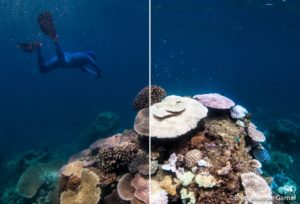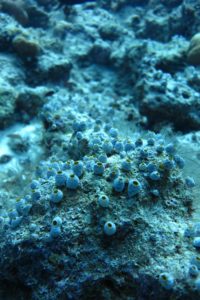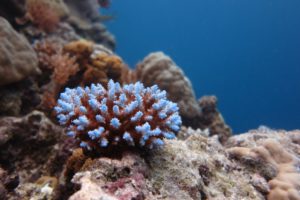
Research Confidence in the field of Coral Reef Futures
(Based on IPCC 2019 Report, Chapter 5, Changing Ocean, Marine Ecosystems, and Dependent Communities)
Author, Jennifer McWhorter, PhD Candidate QUEX (Universities of Queensland and Exeter)
The Intergovernmental Panel on Climate Change (IPCC) consists of a team of top researchers and scientists advising global climate action. Recently, the IPCC wrote a special report updating research findings pertaining to 1.5 ℃ of warming, of particular interest to my field of research is the section on coral reefs. Based on Chapter 5 of the latest IPCC report (Bindoff, N.L et al., 2019), I have highlighted the consensus of scientific research by summarizing key topics of coral reef research by research confidence. In italics are statements summarized from the report.
Very High Confidence Overview of Research
Some alarming numbers on the future of coral reefs were confidently stated in the latest IPCC report, “coral reefs are projected to decline by a further 70-90% at 1.5 ℃ with larger losses (>99%) at 2 ℃ ”. Since the industrial revolution in the 19th century, human activities have contributed to approximately 1.0 ℃ of global warming. At our current rate of emissions, global warming is estimated to reach 1.5 ℃ between 2030 and 2052. (IPCC, 2019: Summary for Policymakers). To give you some perspective on those numbers, future generations will have a difficult time finding coral reefs in the state in which we have had the privilege of experiencing them.

High Confidence Overview of Research
When the human body has a weakened immune system, such as experiencing chemotherapy from cancer treatment, a common cold or flu can be detrimental, leading to a worsened state or even death. Coral reefs facing multiple disturbances such as warming and ocean acidification, reef dissolution and bioerosion, enhanced storm intensity, enhanced turbidity, and/or enhanced run-off have a lower chance of recovery. In the future, when faced with multiple threats, there will be a shift in species composition and biodiversity. This shift will be towards soft corals and algal dominated reefs as opposed to reef building corals. Albeit, regional differences in levels of reef vulnerability exist on a scale of 100 km or by latitudinal gradients.

Medium Confidence Overview of Research
Record breaking warm water temperatures during 2014-2017 resulted in severe and wide-spread global coral mortality (Eakin et al., 2019). The reefs that have survived this event have a higher thermal threshold resulting in a dominance of species that are not as sensitive and have a high adaptive capacity. Is this a glimmer of hope? Perhaps but, it is important to note that this is the category of medium confidence of an overview of the research.

In a physical world, the ocean is complex, different zones of the ocean experience various conditions in space and time. Coral reef habitats are not uniform. Deeper coral reefs (30-150m) and upwelling zones may serve as a refuge and source of larval supply to disturbed reefs. On the contrary, these reefs could be more at risk than suggested.
Low Confidence Overview of Research
Coral reefs require certain light and temperature conditions in order to grow. The rate of sea level rise may outpace coral growth. Sea level rise would send corals into deeper habitats potentially limiting these ideal light and temperature conditions.
Resilience and adaptation is broadly still unknown, few reefs are showing resilience. Luckily, some of the best in the world are working hard to close this gap.

Support climate change research initially by learning about it. Thank you for reading.
You can follow Jen on Twitter to keep up to date with her research!
#ExeterMarine is an interdisciplinary group of marine related researchers with capabilities across the scientific, biological, medical, engineering, humanities and social science fields.
Find us on: Facebook : Twitter : Instagram : LinkedIn
If you are interested in working with our researchers or students, contact Michael Hanley or visit our website!
References:
Bindoff, N.L., W.W.L. Cheung, J.G. Kairo, J. Arístegui, V.A. Guinder, R. Hallberg, N. Hilmi, N. Jiao, M.S. Karim, L. Levin, S. O’Donoghue, S.R. Purca Cuicapusa, B. Rinkevich, T. Suga, A. Tagliabue, and P. Williamson, 2019: Changing Ocean, Marine Ecosystems, and Dependent Communities. In: IPCC Special Report on the Ocean and Cryosphere in a Changing Climate [H.-O. Pörtner, D.C. Roberts, V. Masson-Delmotte, P. Zhai, M. Tignor, E. Poloczanska, K. Mintenbeck, A. Alegría, M. Nicolai, A. Okem, J. Petzold, B. Rama, N.M. Weyer (eds.)]. In press.
Eakin, C. Mark, Hugh PA Sweatman, and Russel E. Brainard. “The 2014–2017 global-scale coral bleaching event: insights and impacts.” Coral Reefs 38.4 (2019): 539-545.
Hughes, T. P., Kerry, J. T., Baird, A. H., Connolly, S. R., Dietzel, A., Eakin, C. M., … & McWilliam, M. J. (2018). Global warming transforms coral reef assemblages. Nature, 556(7702), 492.
IPCC, 2019: Summary for Policymakers. In: IPCC Special Report on the Ocean and Cryosphere in a Changing Climate [H.-O. Pörtner, D.C. Roberts, V. Masson-Delmotte, P. Zhai, M. Tignor, E. Poloczanska, K. Mintenbeck, A. Alegría, M. Nicolai, A. Okem, J. Petzold, B. Rama, N.M. Weyer (eds.)]. In press.
